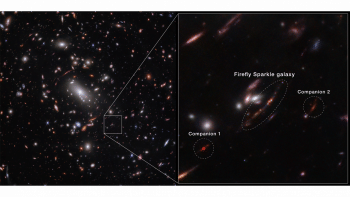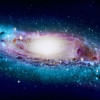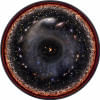The scale of the universe and our place in it

To truly understand our place in the universe, we must first comprehend the concept of scale. It is only through understanding the relative sizes of the entities around us that we can appreciate the grandeur of existence and the humility it demands. Consider this: compared to the universe, we are minuscule, far smaller than even the tiniest microscopic objects—such as atoms, bacteria, or viruses—are to us. The ratio of a human's size to the universe's size is approximately 1/10^24, while the ratio of an atom's size to a human's size is 1/10^10. This stark comparison provides a glimpse into how infinitesimal we truly are in the cosmic context.
The vastness of the universe is almost incomprehensible. Scientists estimate its diameter to be 93 billion light-years. For perspective, the distance between Earth and the Sun is about 147 million kilometres, which translates to roughly 1.58/100,000 light-years. Against this infinite expanse, the Earth is but a speck of dust, and humans are smaller still. Now imagine the scale of the being or force that created this immense cosmos. How minute must our individual existence appear from that vantage point?
This realisation is not meant to diminish our significance, but rather to inspire awe and perspective. Many religious traditions highlight the creator's infinite forgiveness, perhaps because, on a cosmic scale, our petty grievances, conflicts and selfish actions seem trivial. Instead of focusing on such trivialities, we should strive for collective well-being and meaningful contributions to the greater good. Our actions, viewed collectively, shape the world we live in, and this collective behaviour matters far more than individual missteps.
To understand the power of scale, consider this analogy: for someone with only 100 units of currency, even one unit is immensely valuable. For someone with 100 billion units, however, even 100 units are negligible. This principle applies universally: the larger the scale we consider, the smaller individual contributions or actions seem. Similarly, to understand the universe's vastness, we must expand our perspective, learning to see beyond our immediate surroundings.
An everyday example of scale can be found in a seemingly empty container. Although it appears vacant, it contains countless air molecules. These molecules, invisible to the naked eye, collide with the container's walls at random speeds. The average force per unit area of these collisions creates what we call pressure. Similarly, room temperature represents the average kinetic energy of these molecules. No one molecule's specific behaviour matters; it is the collective behaviour that defines the observable phenomenon. This mirrors humanity's progress—it is the cumulative contributions of countless individuals that propel society forward.
The analogy of collective behaviour extends to nation-building. A country's well-being depends on the average behaviour of its citizens. In a society as small as ours when viewed against the universe, the prevalence of corruption, theft, and violence seems tragically unnecessary. What purpose does such behaviour serve in the grand scheme of things?
Take Bangladesh as an example. If we want to build a prosperous nation, collective good behaviour is essential. Our well-being as a society depends on our ability to act with integrity, kindness, and unity. The contributions of the majority determine whether we thrive or falter.
As humans, our sense of belonging is inherently tied to scale. If you were to travel to another planet and were asked where you are from, your answer would be "Earth." On Earth, you might identify yourself by your country, such as "Bangladesh." Within Bangladesh, you'd narrow it down to your district, town, or even neighbourhood. Our sense of kinship expands or contracts depending on the scale of the context. Beyond Earth, all humans feel like family. Within a country, fellow citizens are our kin. And so, our sense of connection grows narrower as the scope shrinks.
Understanding scale clarifies our responsibilities as humans. It teaches us to be generous, humble, and open-minded. This is why writers and thinkers urge us to visit the sea, climb mountains, or gaze at the horizon—such experiences remind us of our smallness and inspire a broader perspective. They help us grow in empathy and understanding, encouraging us to think collectively rather than selfishly.
To truly grasp our place in the universe is to embrace humility and the drive for collective good. In the grand design of the cosmos, our greatest contribution lies in fostering unity, acting with integrity, and striving for the betterment of all. Let the vastness of the universe inspire us to rise above trivial conflicts and embrace a more generous, meaningful existence.
Dr Kamrul Hassan Mamun is professor in the Department of Physics at Dhaka University.
Views expressed in this article are the author's own.
Follow The Daily Star Opinion on Facebook for the latest opinions, commentaries, and analyses by experts and professionals. To contribute your article or letter to The Daily Star Opinion, see our guidelines for submission.

 For all latest news, follow The Daily Star's Google News channel.
For all latest news, follow The Daily Star's Google News channel. 










Comments